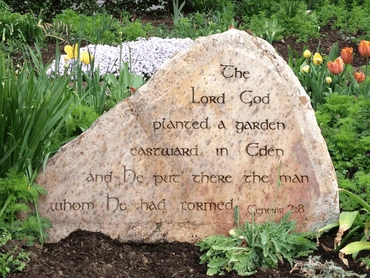Explanation of Genesis 2:17
Ni Brian David

There is, for everyone, a crossroads when it comes to spiritual things, a basic decision to be made. Are you going to believe in the Lord and in spiritual reality? Or are you only going to believe what you can see, touch, feel and otherwise "know" from your own mind? The Writings say those who choose the latter course are closing themselves off from the truth, because by definition spiritual reality cannot be seen, touched, felt or otherwise "known" through purely human means. That's what it means to eat "of the tree of the knowledge of good and evil," and it leads to spiritual death – which is being cut off from the goodness and truth the Lord wishes to bestow on us.
The people of the Most Ancient Church were in a state of love to the Lord, and had been invited to gather all the wisdom and knowledge flowing from that love – the fruit of all the other trees. But they had to accept the Lord as the source, had to accept that He existed, had to accept that He was infinite and beyond their finite understanding. To think otherwise – to think that through their own minds they could explain the Lord – would be to put themselves above him, and lead them into evil.
It's worth noting that this was not a call for people to shut down their minds. The fruit of the other trees represents an incredible bounty of exploration, learning and wonderment. And we're not called on to shut down our minds today; the Lord gave us our intellectual faculties for a reason. To let the Lord in, though, we have to accept the unprove-able idea that He is love itself and reality itself, and see all other knowledge in that light.
(Mga Sanggunian: Arcana Coelestia 126-132, 127, 128-134, 129, 0130)
Arcana Coelestia # 129
129. Anybody can recognize that the basic assumptions a person makes, even when completely false, govern him, and that all knowledge and reasoning buttress those assumptions. For countless flattering ideas occur to him to confirm him in falsities. Consequently when a person's basic assumption is to believe nothing until he sees and understands it, he cannot possibly believe; for spiritual and celestial things are neither visible to the eyes nor comprehensible in mental images. But the true order is for a person to become wise from the Lord, that is, from His Word. In that case everything follows as it should, and he is also enlightened in matters of reason and of fact. Indeed nobody is forbidden to acquire knowledge, since it is useful for life and gives delight. And the person in whom faith resides is in no way forbidden to think and to talk as learned people in the world do. But he does so from the premise of belief in the Lord's Word and of confirming spiritual and celestial truths by means of natural truths, using as far as is possible the terminology of the learned world. Consequently his premise must be the Lord, not self; the former is life, while the latter is death.






